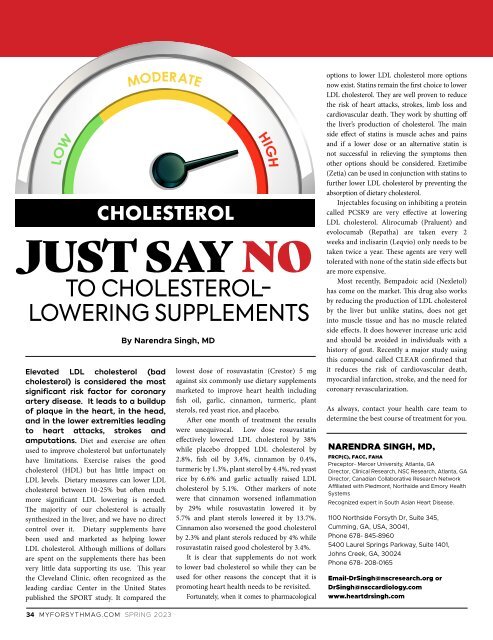My Forsyth _ Spring 2023
Women in Business, Homeownership, Finances, Food, Health & Wellness, and Architecture are just a few of the articles you'll find in the latest issue of your community magazine. Sit back and enjoy. Happy reading!
Women in Business, Homeownership, Finances, Food, Health & Wellness, and Architecture are just a few of the articles you'll find in the latest issue of your community magazine. Sit back and enjoy. Happy reading!
You also want an ePaper? Increase the reach of your titles
YUMPU automatically turns print PDFs into web optimized ePapers that Google loves.
CHOLESTEROL<br />
JUST SAY NO<br />
TO CHOLESTEROL-<br />
LOWERING SUPPLEMENTS<br />
Elevated LDL cholesterol (bad<br />
cholesterol) is considered the most<br />
significant risk factor for coronary<br />
artery disease. It leads to a buildup<br />
of plaque in the heart, in the head,<br />
and in the lower extremities leading<br />
to heart attacks, strokes and<br />
amputations. Diet and exercise are often<br />
used to improve cholesterol but unfortunately<br />
have limitations. Exercise raises the good<br />
cholesterol (HDL) but has little impact on<br />
LDL levels. Dietary measures can lower LDL<br />
cholesterol between 10-25% but often much<br />
more significant LDL lowering is needed.<br />
The majority of our cholesterol is actually<br />
synthesized in the liver, and we have no direct<br />
control over it. Dietary supplements have<br />
been used and marketed as helping lower<br />
LDL cholesterol. Although millions of dollars<br />
are spent on the supplements there has been<br />
very little data supporting its use. This year<br />
the Cleveland Clinic, often recognized as the<br />
leading cardiac Center in the United States<br />
published the SPORT study. It compared the<br />
By Narendra Singh, MD<br />
lowest dose of rosuvastatin (Crestor) 5 mg<br />
against six commonly use dietary supplements<br />
marketed to improve heart health including<br />
fish oil, garlic, cinnamon, turmeric, plant<br />
sterols, red yeast rice, and placebo.<br />
After one month of treatment the results<br />
were unequivocal. Low dose rosuvastatin<br />
effectively lowered LDL cholesterol by 38%<br />
while placebo dropped LDL cholesterol by<br />
2.8%, fish oil by 3.4%, cinnamon by 0.4%,<br />
turmeric by 1.3%, plant sterol by 4.4%, red yeast<br />
rice by 6.6% and garlic actually raised LDL<br />
cholesterol by 5.1%. Other markers of note<br />
were that cinnamon worsened inflammation<br />
by 29% while rosuvastatin lowered it by<br />
5.7% and plant sterols lowered it by 13.7%.<br />
Cinnamon also worsened the good cholesterol<br />
by 2.3% and plant sterols reduced by 4% while<br />
rosuvastatin raised good cholesterol by 3.4%.<br />
It is clear that supplements do not work<br />
to lower bad cholesterol so while they can be<br />
used for other reasons the concept that it is<br />
promoting heart health needs to be revisited.<br />
Fortunately, when it comes to pharmacological<br />
options to lower LDL cholesterol more options<br />
now exist. Statins remain the first choice to lower<br />
LDL cholesterol. They are well proven to reduce<br />
the risk of heart attacks, strokes, limb loss and<br />
cardiovascular death. They work by shutting off<br />
the liver’s production of cholesterol. The main<br />
side effect of statins is muscle aches and pains<br />
and if a lower dose or an alternative statin is<br />
not successful in relieving the symptoms then<br />
other options should be considered. Ezetimibe<br />
(Zetia) can be used in conjunction with statins to<br />
further lower LDL cholesterol by preventing the<br />
absorption of dietary cholesterol.<br />
Injectables focusing on inhibiting a protein<br />
called PCSK9 are very effective at lowering<br />
LDL cholesterol. Alirocumab (Praluent) and<br />
evolocumab (Repatha) are taken every 2<br />
weeks and inclisarin (Leqvio) only needs to be<br />
taken twice a year. These agents are very well<br />
tolerated with none of the statin side effects but<br />
are more expensive.<br />
Most recently, Bempadoic acid (Nexletol)<br />
has come on the market. This drug also works<br />
by reducing the production of LDL cholesterol<br />
by the liver but unlike statins, does not get<br />
into muscle tissue and has no muscle related<br />
side effects. It does however increase uric acid<br />
and should be avoided in individuals with a<br />
history of gout. Recently a major study using<br />
this compound called CLEAR confirmed that<br />
it reduces the risk of cardiovascular death,<br />
myocardial infarction, stroke, and the need for<br />
coronary revascularization.<br />
As always, contact your health care team to<br />
determine the best course of treatment for you.<br />
NARENDRA SINGH, MD,<br />
FRCP(C), FACC, FAHA<br />
Preceptor- Mercer University, Atlanta, GA<br />
Director, Clinical Research, NSC Research, Atlanta, GA<br />
Director, Canadian Collaborative Research Network<br />
Affiliated with Piedmont, Northside and Emory Health<br />
Systems<br />
Recognized expert in South Asian Heart Disease.<br />
1100 Northside <strong>Forsyth</strong> Dr, Suite 345,<br />
Cumming, GA, USA, 30041,<br />
Phone 678- 845-8960<br />
5400 Laurel <strong>Spring</strong>s Parkway, Suite 1401,<br />
Johns Creek, GA, 30024<br />
Phone 678- 208-0165<br />
Email-DrSingh@nscresearch.org or<br />
DrSingh@nsccardiology.com<br />
www.heartdrsingh.com<br />
34 MYFORSYTHMAG.COM SPRING <strong>2023</strong>












